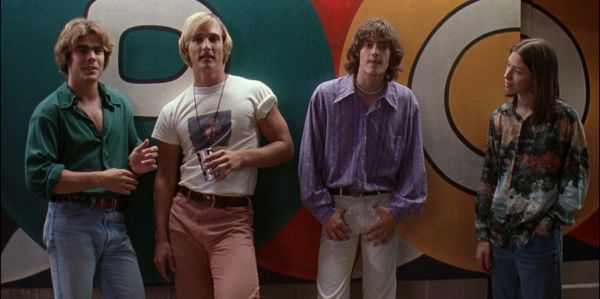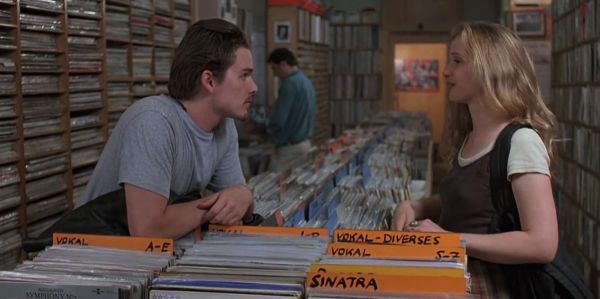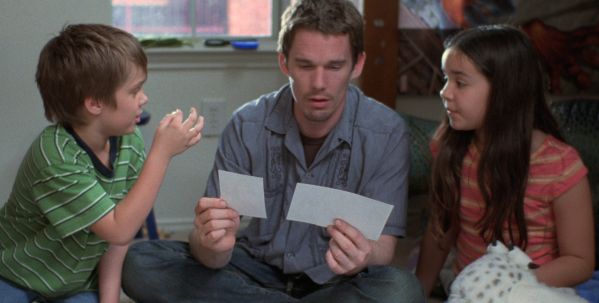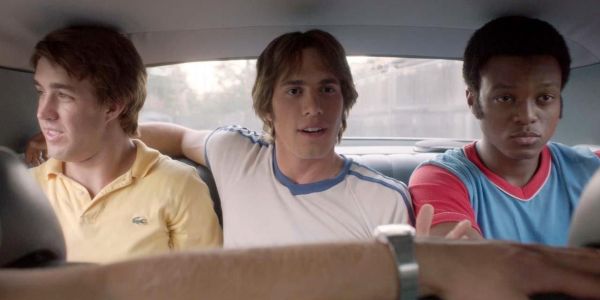The Beginner’s Guide: Richard Linklater, Writer/Director

Matt is a critic from the UK.
For many people their introduction to Richard Linklater’s work will have been through the Jack Black comedy, School of Rock, which has become something of a cult classic for people of a certain age. Or perhaps it will have been 2014’s Boyhood, the incredibly inventive coming of age tale which very nearly went home with the Best Picture award on Oscar night.
Linklater has a rich filmography dating back to the early nineties in Austin, Texas, and he played a significant part in making that city the film hub it is today and in defining a generation of “Slackers.” Throughout his work Linklater has explored various themes, from the fragility of teen male bonding to the reality of marital struggles, with discussions on philosophy thrown in at every opportunity. His movies are often slow and contemplative, with lengthy monologues and conversations.
Sometimes though Linklater steps away from his more meditative work to tackle more comedy-orientated material. His Jack Black collaborations Bernie and the aforementioned School of Rock are more broadly funny works but they still carry the heart that Linklater instils in all his movies. His great skill is in crafting real people and filming them with compassion.
With his new movie, Where’d You Go, Bernadette coming out later this year, I will look back at his career to build a great jumping off point for people wanting to get into the work of Richard Linklater. The focus here is on six crucial films in his development as a director but there are more worth seeking out, which will be discussed at the end.
Slacker (1991)

With Slacker, Linklater helped to define a generation. The experimental film charts the paths of a hundred different bizarre and intriguing characters over a twenty four hour period, as they walk around Austin, Texas. In the process of this 100 minute film, Linklater popularised the term slacker and gave Generation X their own bohemian film of disconnectedness and disconformity.
In classic independent cinema fashion, Linklater used what he knew and what he had at his disposal for his feature, Slacker. This it turns out, included Texas. This use of Austin, Texas in particular in his films became a trademark of Linklater’s, and ultimately helped in creating the city’s hip film image today. Linklater himself founded the Austin Film Society back in 1985, and Slacker brought about the dawn of the Austin film scene as we know today, spawning a thousand imitators.
For Richard Linklater, Austin was never merely a setting but also a character in his movies. Perhaps this is never more evident than in Slacker, because the lack of a tangible plot lays a heavy load on the engaging setting.
Dazed And Confused (1993)

After the success of the low budget Slacker, Richard Linklater did not shift dramatically from that movie’s formula, but instead merely veered slightly away. In his follow up, Dazed and Confused Linklater kept some aspects the same (the oversized cast of characters, the loose plot and ending) but framed it inside the always popular high school comedy. What begins as a fun take on the high school movie though, develops into a reflective nostalgia-tinted ride through the last days of not just school, but the teenage years and even home.
In Linklater’s already capable hands the nostalgic haze is never nauseating but genuinely sweet. Set in 1976 we follow different groups of high schoolers as they all look forward to the annual end of year keg party. First though they all have to deal with the realities of being a teenager. Dazed and Confused will leave you yearning for that time in your life, even if just for the blissful ignorance of the teen years.
Before Sunrise (1995)

At this time in his career, Richard Linklater may well have been at risk of being pigeonholed for the thematically similar Slacker and Dazed and Confused. So instead of delving more deeply into teenagers in Austin, he moved the action to Vienna and in the process kick-started one of the greatest trilogies in modern cinema.
In Before Sunrise Linklater sets up a meet cute for Ethan Hawke’s Jessie and Julie Delpy’s Celine on a train and then allows them to play out their romance over a night in the beautiful Austrian city. This loose, conversational film is the first in the Before Trilogy, with each subsequent film released nine years after the last (Before Sunset, 2004; Before Midnight, 2013).
It displays beautifully with such apparent ease and grace the dizzying reality of young instinctive love. Taking cues from independent cinema’s masters of old, especially the French New Wave’s Rohmer and Godard, Jessie and Celine walk through the streets, learning about each other through conversation after conversation.
Sunrise is a superb film, but it may actually be the weakest in the trilogy. This is only because 2004’s Sunset and 2013’s Midnight have the luxury of building upon the relationship crafted in this opening chapter. For a painful, tear-inducing but life-affirming look at the reality of relationships watch the trilogy back to back.
School of Rock (2003)

With School of Rock, Richard Linklater once again chose to surprise his audience. After being a darling of independent cinema for a decade, he took on a project that on paper looked like a run of the mill studio comedy. Arguably Linklater’s most commercially viable film to date, School of Rock is the story of Jack Black’s Dewey, a failing musician, who impersonates his friend, a substitute teacher, in order to make a living.
At the private school in which he poses as a teacher, Dewey ignores classic lessons in favour of teaching the students how to rock and roll. School of Rock became the highest grossing musical comedy at the time. Despite the bigger budget and name recognition of the star, Linklater still manages to put his unique stamp on the film, unlike many indie filmmakers making the step to studio-influenced movies. It’s a charming underdog tale that showed that Linklater was adaptable and had the ability to succeed in any genre.
Boyhood (2014)

In 2002, Richard Linklater began filming Boyhood. One of the most uniquely imaginative endeavours in mainstream American film in recent years, Linklater filmed Boyhood over the next twelve years, charting the growth and development of his characters on screen. Protagonist, Mason, literally grows up before our eyes. From his introduction as an 8 year old, to his final goodbye as he heads off to college at 18, we track the story of this family.
What is so beautiful about Boyhood is Linklater’s insistence on the smaller details. He isn’t concerned with chronicling every big argument, or the “set pieces” that other similar movies focus on. Instead he peeks in on the intimate moments of everyday life, the lives we all lead that are forgotten by the big screen.
A criticism that has been perhaps fairly levelled at Linklater is his lack of complex female characters. Besides Celine in the Before Trilogy his movies tend to focus on the male bond. However, whilst Boyhood does chart the coming of age of a Texan boy, it is almost as much his mother’s film. Patricia Arquette builds upon a well written part to make Mason’s mother, Olivia, perhaps the most interesting character in the whole film. She deservedly picked up the Best Supporting Actress award at the 2015 Oscars.
Everybody Wants Some!! (2016)

Returning to his roots with Everybody Wants Some!!, Richard Linklater created a spiritual sequel to Dazed and Confused. Whilst Dazed was a surprisingly moving reflection on the last days of high school, Everybody wants Some!! skips forward to the first days of college, revelling in the rowdy atmosphere of teenagers celebrating a form of independence.
Back in 1980, freshman Jake arrives on campus and joins the college baseball house where he will live with his teammates. In classic Linklater fashion he keeps the timeframe of the movie short, with all the action taking place over the weekend before lessons start. As with School of Rock, in a lesser director’s hands, Everybody Wants Some!! could’ve been another run of the mill comedy movie. Linklater however delves into his bag of tricks and this time comes up with a funny yet poignant analysis of the bizarre moment between childhood and adulthood before responsibilities hit and when thoughts are squarely focused on alcohol and fun.
Your next step into Richard Linklater’s filmography
After you’ve burned through these crucial items in his filmography, delve deeper and check out:
Before Sunset (2004); Before Midnight (2013); Waking Life (2001); Tape (2001); A Scanner Darkly (2006); Bernie (2011); Last Flag Flying (2017). You can also find his $3,000 debut feature It’s Impossible to Learn to Plow by Reading Books (1988) as an extra on the Criterion Collection DVD/Blu-ray of Slacker (1991).
In Conclusion
After Richard Linklater’s breakthrough, other DIY directors such as Kevin Smith followed in his footsteps and together they helped define 90s independent cinema. As all great directors do, Linklater has developed from those early days though of Slacker and Dazed and Confused.
There are still nods to those days, whether through setting or recurring actors, but Linklater is a director constantly moving forward. Since the early nineties he has crafted a near perfect romantic trilogy, dipped his toe into mainstream comedy and most recently taken a heartfelt look at the aftermath of war (Last Flag Flying). Whilst he’ll always maintain that link with Texas, Linklater is a risk-taker who has blazed his own path in the history of modern American film.
What’s your favourite Richard Linklater film? Leave a comment below.
Does content like this matter to you?
Become a Member and support film journalism. Unlock access to all of Film Inquiry`s great articles. Join a community of like-minded readers who are passionate about cinema - get access to our private members Network, give back to independent filmmakers, and more.
Matt is a critic from the UK.













